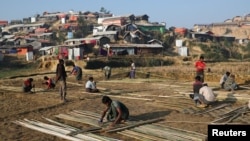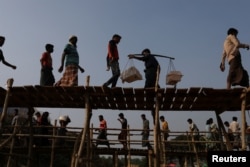Rohingya Muslim refugees who fled attacks in Myanmar said they were disappointed that a U.N. agreement signed earlier this week did not address one of their key demands: citizenship.
Most refugees say they are desperate to go home, but fear going back unless they are given protection and citizenship.
On Wednesday, Myanmar and U.N. agencies signed an agreement that could — eventually — lead to the return of some of the 700,000 Rohingya who fled persecution in their homeland and are now crowded into makeshift camps in Bangladesh.
While the refugees welcomed the talks, they have also heard years of empty promises from the government in Yangon.
Mohammed Toiteb Ali, who fled brutal attacks last year that sent hundreds of thousands of Rohingya across the border, said Yangon could first give citizenship to the Rohingya who remain in Myanmar.
"When we are assured by seeing and knowing that they are enjoying their citizenship, then we will go back," Ali said Friday, while strolling through the crowded market of the Kutupalong refugee camp.
Many said they would not be truly happy with an agreement unless it announces that the Rohingya will get citizenship and the return of the property they lost in the pogroms.
"When the whole world will see this, when we will see these developments, then we will go back," said Mohammed Syed, another refugee who fled last year.
U.N. officials have called the agreement an important first step in complex discussions.
The agreement signed Wednesday will create a "framework of cooperation" designed to create conditions for "voluntary, safe, dignified and sustainable" repatriation of the Rohingya. It does not address Myanmar's denial of citizenship to the Rohingya.
Myanmar officials say they hope the agreement will speed up repatriation, but rights groups doubt Yangon will let many Rohingya go back, or if officials can guarantee the safety of those who do.
Myanmar's statement didn't use the word "Rohingya," reflecting the insistence by the government and the country's Buddhist majority that the ethnic group doesn't even exist. Most people in Myanmar view the Rohingya as illegal migrants from Bangladesh, though some have lived in the country for centuries, before modern borders existed. The agreement described the refugees as "displaced persons."
Myanmar security forces have been accused of laying waste to Rohingya villages last year in Rakhine state, near the Bangladesh border, where most Rohingya lived. The military's self-proclaimed "clearance operations" were set off by a Rohingya militant group's assault on police posts.
The U.N. and the U.S. have described the military campaign as "ethnic cleansing."
U.N. officials note that the Wednesday agreement gives its agencies access to Rakhine state, allowing it to better assess the situation and inform refugees about conditions back in their villages.





